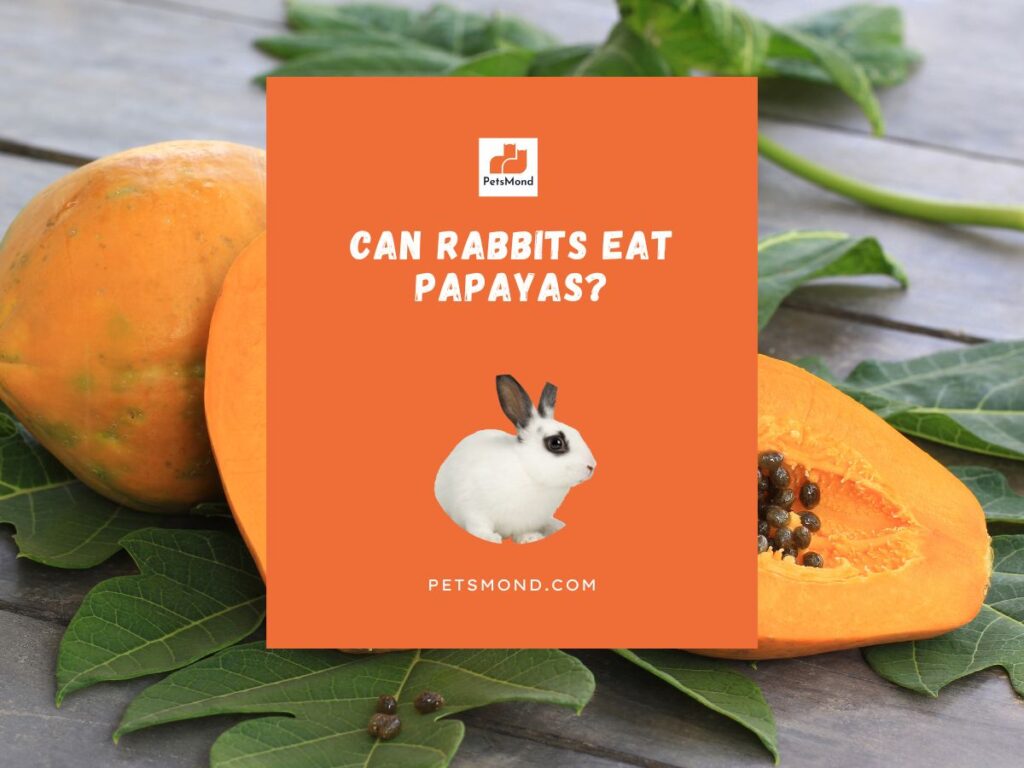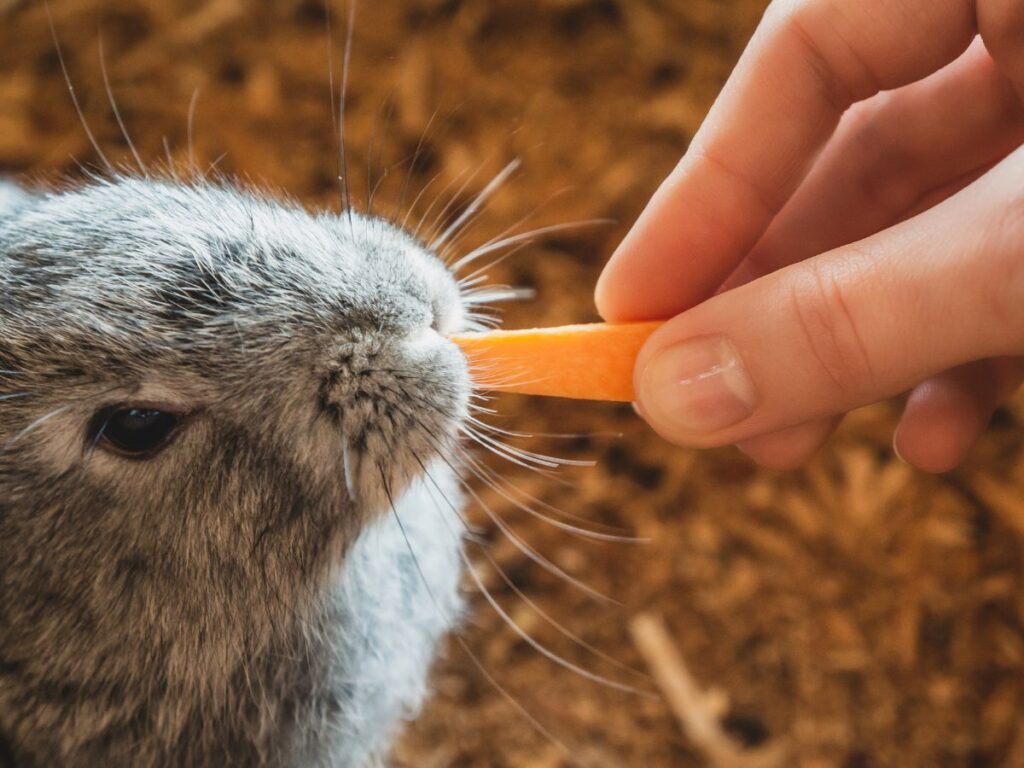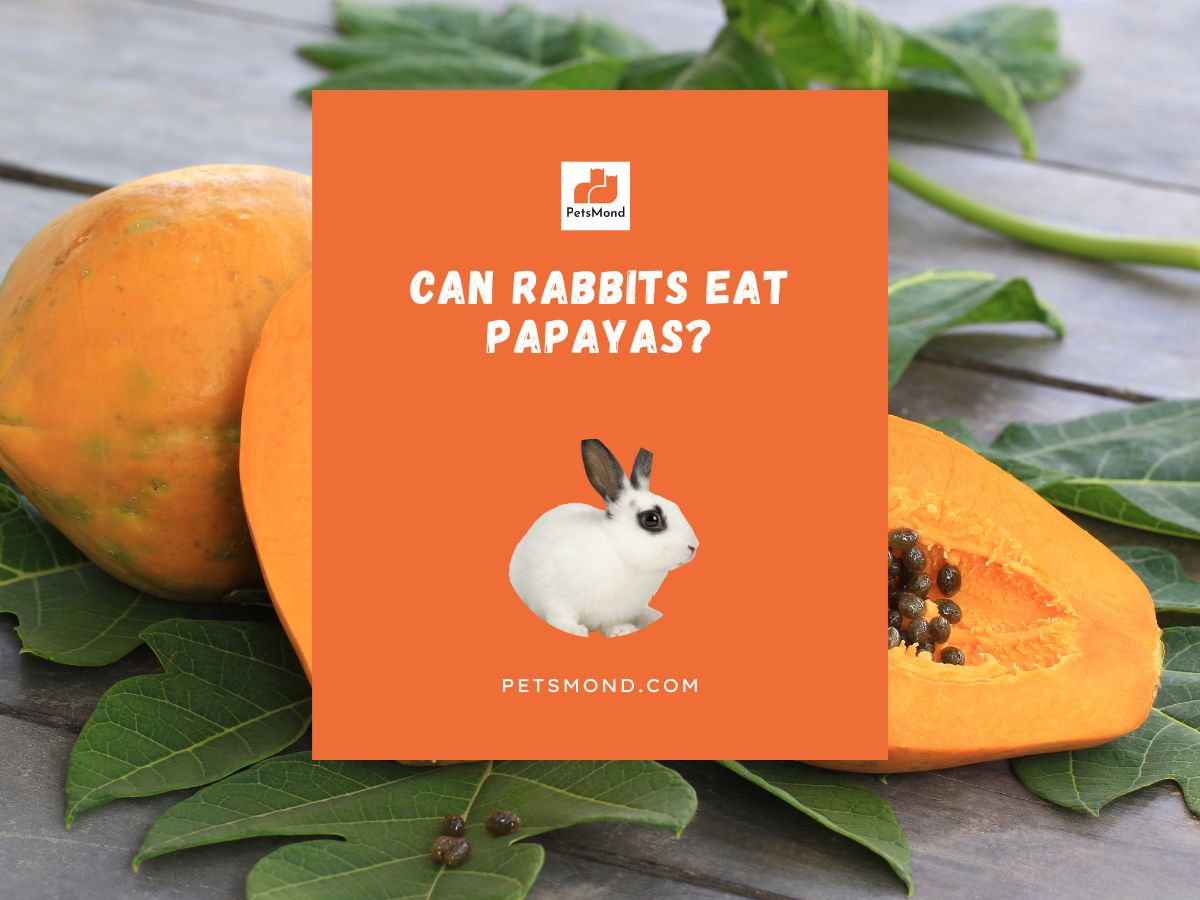Not all fruits are good! Yes, some fruits that you believe to be good to rabbits can do worse and vice versa holds too. One of the most controversial fruits for rabbits was papaya. 11 years ago, when I was holding a papaya piece just to feed my rabbit, I was terribly confused looking at mixed and raving reviews about this fruit. Some believe that papayas contain bad enzymes that can disrupt their stomachs. However, some recommend this fruit. What’s the truth? Can rabbits eat papaya?
Rabbits can eat papayas at the rate of 1-2 small pieces/week for adults. However, this fruit demands moderation as well. While the skin is safe, it’s recommended to avoid feeding skin, seeds, and any other parts except the flesh, although it’s deemed to be loaded with vitamins, minerals, and healthy enzymes.
Okay, I understand that you’d take it as a general precaution. But unlike most fruits, there’s one version of papaya that’s widely given to rabbits. I’ll be talking about every aspect of this fruit and also the new form that’s all famous. This article covers:

Let’s get started!
Nutritional Information of Papayas
When it comes to feeding your rabbit, it’s important to understand the nutritional content of the foods you’re offering. Papayas are a great source of vitamins and minerals that can benefit your rabbit’s health.
Here’s a breakdown of the nutritional content of papayas per 100g:
| Nutrient | Amount |
|---|---|
| Calories | 43 |
| Protein | 0.5g |
| Fat | 0.3g |
| Carbohydrates | 11g |
| Fiber | 1.7g |
| Vitamin A | 950 IU |
| Vitamin C | 60.9mg |
| Calcium | 20mg |
| Phosphorus | 10mg |
| Potassium | 182mg |
While papayas are a good source of vitamins and minerals, it’s important to note that rabbits have specific dietary requirements that may not be met by papayas alone. For example, rabbits require a high-fiber diet to maintain healthy digestion. While papayas do contain fiber, they should not be the primary source of fiber in your rabbit’s diet.
In terms of specific nutrient requirements, rabbits require around 20-25mg of vitamin C per day. One 100g serving of papaya contains 60.9mg of vitamin C, which is more than enough to meet your rabbit’s daily needs. However, it’s important to note that rabbits are able to produce their own vitamin C, so supplementation may not be necessary if your rabbit is otherwise healthy and eating a balanced diet.
Rabbits also require around 500mg of calcium per day, which is not provided in significant amounts by papayas. While papayas do contain some calcium, it should not be relied upon as the sole source of this important nutrient. Instead, offer your rabbit a variety of leafy greens and other calcium-rich vegetables to ensure they are meeting their daily requirements.
Do Rabbits Love Eating Papayas?
While every rabbit has their own unique tastes and preferences, many rabbits do enjoy eating papayas. Here are a few reasons why your rabbit might love munching on this tropical fruit:
- Sweet taste: Papayas are naturally sweet, which can make them appealing to rabbits who have a taste for sugary treats.
- Soft texture: The soft, juicy texture of papayas can be easy for rabbits to chew and digest, making them a satisfying snack.
Well, these are the common reasons. This fruit can also moderately hydrate the rabbit.
In the case of my rabbits, they didn’t like papayas after tasting them once. That’s the proof that it depends on each rabbit’s interest.
It’s been years and I’ve never fed them papayas after the first denial. If you’re thinking of introducing this fruit, start slow and keep the quantity moderate.

How Much Papaya Can I Give My Rabbit?
The recommended quantity of papaya for adult rabbits is 2-3 pieces a week. It’s better to avoid feeding papayas to baby rabbits although the fruit has a soft texture due to its sweet content.
When offering papayas to your rabbit, be sure to wash the fruit thoroughly and remove any seeds or skin before feeding. Start with a small amount and gradually increase over time to ensure that your rabbit tolerates them well. If your rabbit shows signs of digestive upset or other negative reactions after eating papayas, it’s best to discontinue feeding them the fruit.
Benefits of Papayas for Rabbits
Papayas can be a healthy addition to your rabbit’s diet, offering a variety of benefits for their overall health and wellbeing. Here are a few reasons why you might consider feeding papayas to your rabbit:
- High in fiber: Papayas are a good source of fiber, which can help promote healthy digestion in rabbits.
- Rich in vitamins and minerals: Papayas are packed with vitamins and minerals that can benefit your rabbit’s health, including vitamin C, vitamin A, potassium, and calcium.
- Antioxidant properties: Papayas contain antioxidants that can help protect your rabbit’s cells from damage caused by free radicals.
- Low in calories: Papayas are a low-calorie fruit, which can be a good option for rabbits who are overweight or who need to maintain a healthy weight.
- Sweet taste: The sweet taste of papayas can be appealing to rabbits who have a taste for sugary treats. This can give variety to your rabbit and make them like their ideal diet more.
It’s important to note that while papayas can be a healthy addition to your rabbit’s diet, they should not be relied upon as the sole source of nutrition. Be sure to offer papayas alongside a variety of other fruits, vegetables, and hay to provide a well-rounded diet that meets all of your rabbit’s nutritional needs.
Risks of Feeding Papayas to Rabbits
Every food comes with a range of pros and cons. That holds for papaya as well. If you’re thinking of feeding papayas to rabbits, here’s a list of risks to keep in mind.
- Digestive upset: Rabbits have sensitive digestive systems and may experience digestive upset if they eat too much papaya or if they are not used to the fruit. It’s important to introduce papayas slowly and in moderation to avoid digestive upset.
- High sugar content: While papayas are a low-calorie fruit, they are also high in sugar. Rabbits who consume too much sugar may be at risk for obesity or other health problems.
- Allergic reactions: Some rabbits may be allergic to papayas or may have an adverse reaction to the fruit. If your rabbit shows signs of an allergic reaction, such as itching, swelling, or difficulty breathing, seek veterinary care immediately.
- Calcium deficiency: While papayas are a good source of vitamins and minerals, they are not a significant source of calcium. Rabbits who do not get enough calcium in their diet may be at risk for health problems such as dental issues or bone fractures.
It’s important to note that these risks can be mitigated by offering papayas in moderation as part of a well-rounded diet that meets all of your rabbit’s nutritional needs.
Papaya Tablets For Rabbits: Good Or Bad?
Papaya tablets are a popular supplement that are sometimes given to rabbits to aid in digestion and promote overall health.

These tablets come in different shapes and sizes but the major constituent is the same, papaya!
Here’s what you need to know about these tablets and whether they are a good or bad choice for your rabbit:
- Papaya tablets are made from dried papaya and are often marketed as a natural digestive aid for humans and animals alike.
- There are other ingredients such as enzymes, probiotics, and fiber. The exact composition of papaya tablets can vary depending on the brand and manufacturer.
Should you give it? Let me dive in further.
While papaya tablets may offer some benefits for rabbits, they are not a necessary part of a healthy diet and may not be suitable for all rabbits.
- If your rabbit has a history of digestive issues or is prone to digestive upset, papaya tablets may be a good choice to help promote healthy digestion.
- Papaya tablets should not be relied upon as the sole source of nutrition for your rabbit. It doesn’t balance the nutrition as well.
- Some rabbits may be allergic to papayas or may have an adverse reaction to the other ingredients in papaya tablets.
So, good or bad? Neither my vet nor I would recommend papaya tablets. However, if your rabbit’s vet recommends, be sure to check the exact duration to give these tablets as these aren’t given for the long term.
Papayas: When To Feed & When Not To?
As a pet parent, it’s important to know when to feed your rabbit papayas and when to avoid them to ensure that your rabbit stays healthy and happy. Here’s a table that outlines when to feed and when not to feed papayas to your rabbit:
| When to Feed Papayas | When Not to Feed Papayas |
|---|---|
| As an occasional treat in moderation | If your rabbit has a history of digestive issues or is prone to digestive upset |
| As part of a well-rounded diet that meets all of your rabbit’s nutritional needs | If your rabbit has a known allergy to papayas or is allergic to other tropical fruits |
| If your rabbit enjoys the taste and texture of papayas | If your rabbit is overweight or is on a restricted diet |
| If your veterinarian approves and recommends papayas for your rabbit’s individual needs | If your rabbit is under 3 months of age |
As a pet parent, it’s important to be aware of your rabbit’s individual needs and health history when deciding whether or not to feed them papayas.
List of Fruits Unsafe For Rabbits
Did you know that not all fruits are safe and appropriate for rabbits? Some fruits can be more toxic than you even imagine! On the other hand, some other fruits are safe to eat but specific portions of these fruits can be unsafe.
Guess what? Some rabbits might directly refuse eating certain fruits because they don’t fancy the same. Here’s a video you should watch before heading on to the list:
Here’s a complete list of fruits unsafe for rabbits:
- Avocado
- Rhubarb
- Grapes and raisins
- Citrus fruits
- Stone fruits (cherries, peaches, plums)
- Pits and seeds (apple seeds, cherry pits, peach pits, etc.)
- Tomato leaves and stems
- Potato leaves and stems
- Onions and garlic
- Fruit pits (apricot, cherry, peach, plum)
- Persimmons
- Pineapple
- Pomegranate
- Blackberries
- Blueberries
- Raspberries
- Strawberries (in excess)
- Watermelon (in excess)
FAQs
Can Rabbits Eat Papaya Leaves?
Papaya leaves aren’t toxic but aren’t ideal, either. While the flesh portion of the fruit is appropriate, it’s appropriate to eliminate other portions. In fact, these leaves contain papain and chymopapain that aren’t suitable for rabbit’s digestive system.
Can Rabbits Eat Papaya Skin?
When feeding papaya flesh, some rabbits might bite a portion of the skin as well. While it contains latex, it isn’t recommended thoroughly because it’s prone to pesticides and other environmental infections that can rupture respiratory and digestive systems.
Can Rabbits Eat Papaya Seeds?
Papaya seeds are soft and stick to the flesh. While these are easy to digest, it isn’t recommended as seeds can upset the stomach due to harmful contents. Instead, you can wash the fruit properly and give them a couple of small pieces of the fruit.
Can Rabbits Eat Papaya Everyday?
Any fruit constitutes only 2-5% of a rabbit’s diet, and this includes papaya. Hence, feeding papayas everyday to your rabbit is a bad practice as it can deviate them from their regular diet and might switch them to sugary and new flavorful diets.
Can Rabbits Eat Dried Papaya?
Dried papaya can be a healthy treat for rabbits in moderation, but it’s important to choose a brand that does not contain added sugars or preservatives. I would recommend talking to your vet as we (pet parents) can’t predict consequences. Honestly!
Related Articles


